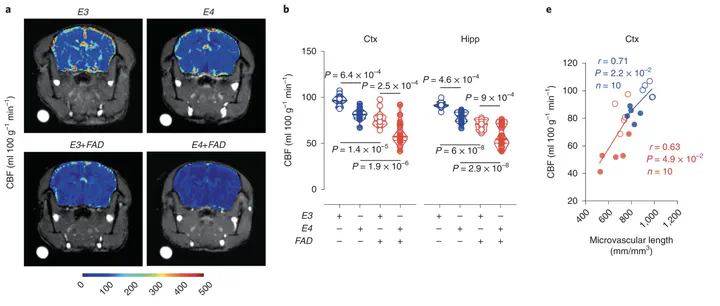APOE4 accelerates advanced-stage vascular and neurodegenerative disorder in old Alzheimer’s mice via cyclophilin A independently of amyloid-β
Jun 14, 2021·,,,,,,,,,,, ,,,·
0 min read
,,,·
0 min read
Axel Montagne
Angeliki M. Nikolakopoulou
Mikko T. Huuskonen
Abhay P. Sagare
Erica J. Lawson
Divna Lazic
Sanket v. Rege
Alexandra Grond
Edward Zuniga
Samuel R. Barnes
Jacob Prince
Meghana Sagare
Ruu Hsu
Mary J. Mary J. LaDu
Russell E. Jacobs
Berislav v. Zlokogic

Abstract
Apolipoprotein E4 (APOE4), the main susceptibility gene for Alzheimer’s disease (AD), leads to vascular dysfunction, amyloid-β pathology, neurodegeneration and dementia. How these different pathologies contribute to advanced-stage AD remains unclear. Using aged APOE knock-in mice crossed with 5xFAD mice, we show that, compared to APOE3, APOE4 accelerates blood-brain barrier (BBB) breakdown, loss of cerebral blood flow, neuronal loss and behavioral deficits independently of amyloid-β. BBB breakdown was associated with activation of the cyclophilin A-matrix metalloproteinase-9 BBB-degrading pathway in pericytes. Suppression of this pathway improved BBB integrity and prevented further neuronal loss and behavioral deficits in APOE4;5FAD mice while having no effect on amyloid-β pathology. Thus, APOE4 accelerates advanced-stage BBB breakdown and neurodegeneration in Alzheimer’s mice via the cyclophilin A pathway in pericytes independently of amyloid-β, which has implication for the pathogenesis and treatment of vascular and neurodegenerative disorder in AD.
Type
Publication
Nature Aging